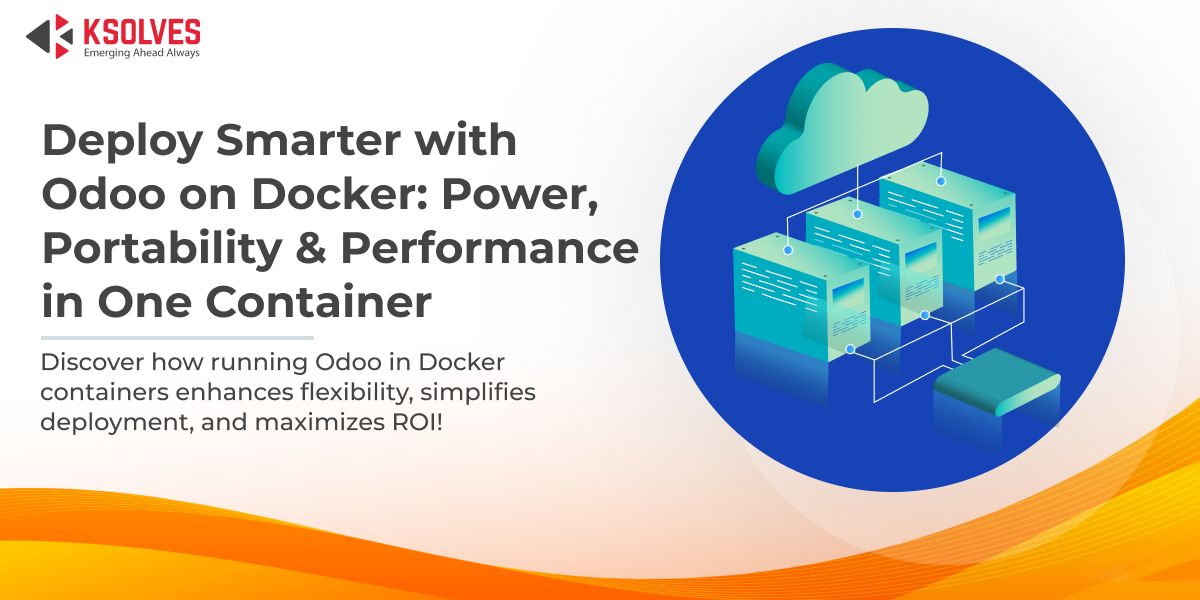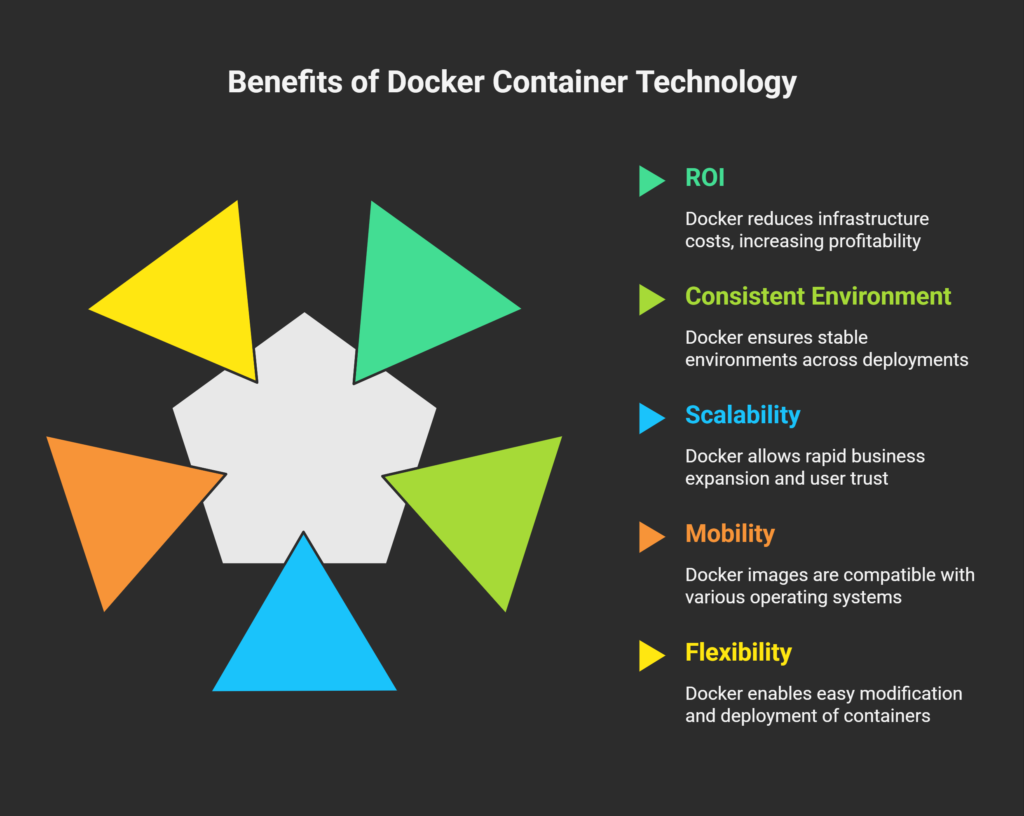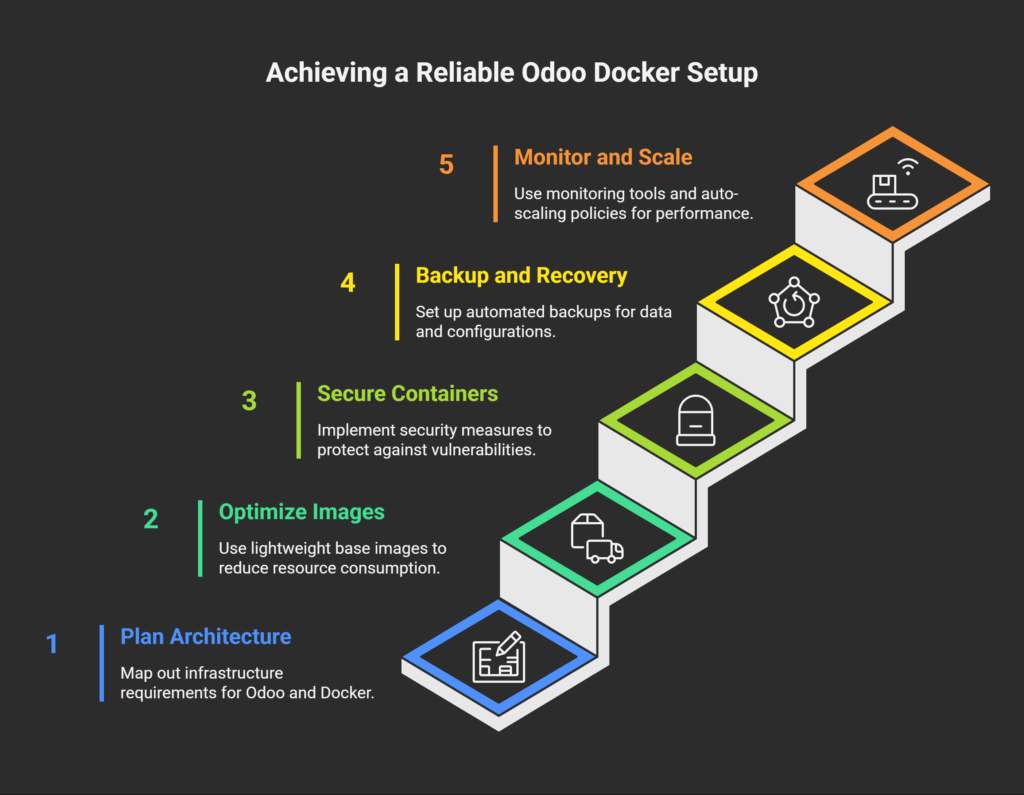Odoo
5 MIN READ
March 30, 2022
![]()

Introduction
Docker is a platform that allows users and developers to deploy, build, manage, and run their apps using containers. It accomplishes this by virtualizing the OS (Operating system) of the device on which it will be running and installed.
Beginning
Docker was founded by Solomon Hykes in 2013 to allow users to run multiple OS on a single computer. The hype has only grown after the release of Docker 1.0 in June 2014.
It has been found that more than 3.6 million programs have been deployed in containers using docker technology. The user does not have to worry about requirements, modules, or a variety of other concerns while utilizing Odoo Docker features.
Let’s understand what Docker is and its relationship with Odoo.
Docker is a tool that allows you to create containers that hold software installation. It includes everything you need to execute the software, like code, runtime, configuration files, executables, and system libraries.
Containers are standardized software units that enable developers to separate their programs from their ecosystem to run them on any system.
The evolution of every technology starts with the aim to solve an existing problem.
Let’s see how the Docker container technology solves the problem of running different Odoo apps on a single server.
Problem
Suppose, you have three different Odoo-based applications that you plan to run on a single server. Moreover, each of these applications needs different versions of Odoo. Since it is practically possible but a hectic task to install and manage different versions of Odoo on a single server. It may lead to over-space consumption, high maintenance cost, and may crash the server.
Solution
With Docker container technology, a user can solve this issue instantly without taking the risk to crash his system. When a user deploys Odoo on Docker it is deployed on a Host.
Docker container does not have any OS (operating system), but it has a virtual copy of the network interfaces and process tables. The virtual operating system is shared across all the containers.
It allows each container to stay isolated from each others while running on the same host. As a result, it allows numerous containers with varying application requirements to operate on the same host as long as they meet the same operating required functionality.
If you want to Deploy Odoo as a Docker, follow the given instructions carefully.
To run Odoo Image on docker we need to do the following steps:
docker run -d -e POSTGRES_USER=odoo -e POSTGRES_PASSWORD=odoo -e POSTGRES_DB=postgres –name db postgres:14
docker run -p 8069:8069 –name odoo –link db:db -t odoo:14.0
docker run -v /data/odoo.conf:/etc/odoo -p 8069:8069 –name odoo –link db:db -t odoo:14.0
Tweak these environment variables to easily connect to a Postgres server:

The primary benefit of Docker Container Technology is ROI. The more a solution can cut down the cost the more ROI a company will get. Therefore, if a company utilizes Docker it can cut the infrastructure cost. The functionality of Docker is that only fewer resources are required to run multiple applications on a single server.
Any business planning to expand its services can use the Docker container technology to earn great ROI.
Developers may use containers to build stable environments that are isolated from other programs. Everything remains constant regardless of where the app is deployed, which leads to tremendous productivity: less time troubleshooting and more time introducing new features and capabilities for consumers.
If you are an Odoo application development company and need to scale your business, you can do it rapidly with Docker. You can use the Docker container and allow your application to run on any server anytime to your users. This will increase your business effectively and you can gain your user’s trust.
Docker Images are compatible with any operating system (Mac, Linux, or Windows). This reduces the time spent setting up environments, troubleshooting environment-specific bugs, and a more portable and easy-to-setup codebase for your developers.
If an upgrade is required during a product’s release, Docker containers may be readily modified, tested, and rolled out as new containers. Another significant benefit of utilizing Docker is its flexibility. Docker really enables you to create, test, and distribute images, which can be deployed across numerous hosts. Furthermore, Docker allows you to quickly start and stop services or apps, which is extremely important in a cloud setting.
By taking advantage of Docker’s methodologies for shipping, testing, and deploying code quickly, you can significantly reduce the delay between writing code and running it in production.
What is Odoo?
Odoo is an open-source suite of business applications that includes modules for CRM, e-commerce, accounting, inventory, project management, and more. It is highly customizable, allowing businesses to tailor the platform to their specific needs. Odoo’s modular structure makes it a powerful tool for businesses of all sizes, from startups to large enterprises, looking to streamline operations and improve efficiency.
When combined with Docker, Odoo becomes even more versatile. Deploying Odoo on Docker allows businesses to leverage containerization for faster setup, easier maintenance, and seamless scalability, making it an ideal choice for modern business environments.
For businesses looking to take full advantage of Odoo Docker containers, advanced development practices can further enhance the deployment process. Here are some key considerations:
By adopting these practices, businesses can achieve a robust Odoo Docker development workflow that maximizes efficiency and minimizes downtime.
For lead implementers tasked with transitioning Odoo to Docker, the following best practices ensure a smooth and successful deployment:

By following these practices, lead implementers can ensure a reliable and scalable Odoo Docker container setup that meets business needs.
Deploying Odoo on Docker can sometimes encounter challenges. Here are common issues and their solutions:
Addressing these issues proactively ensures a smooth Odoo Docker deployment experience.
Who does not want to use a technology that allows them to run multiple applications on a single device that requires multiple OS? With Docker container technology, it is possible to run, manage, and test multiple applications on a single server.
By leveraging Odoo on Docker, businesses can achieve unparalleled flexibility, scalability, and cost-efficiency. Whether you’re a small business looking to streamline operations or a large enterprise aiming to scale rapidly, Odoo with Docker offers a robust solution to meet your needs.
If you need more information about the same, kindly consult with our experts.
Contact us @
Website: https://store.ksolves.com
Phone:+1(646)-203-1075, +91-7498170227
Email: sales@ksolves.com
![]()